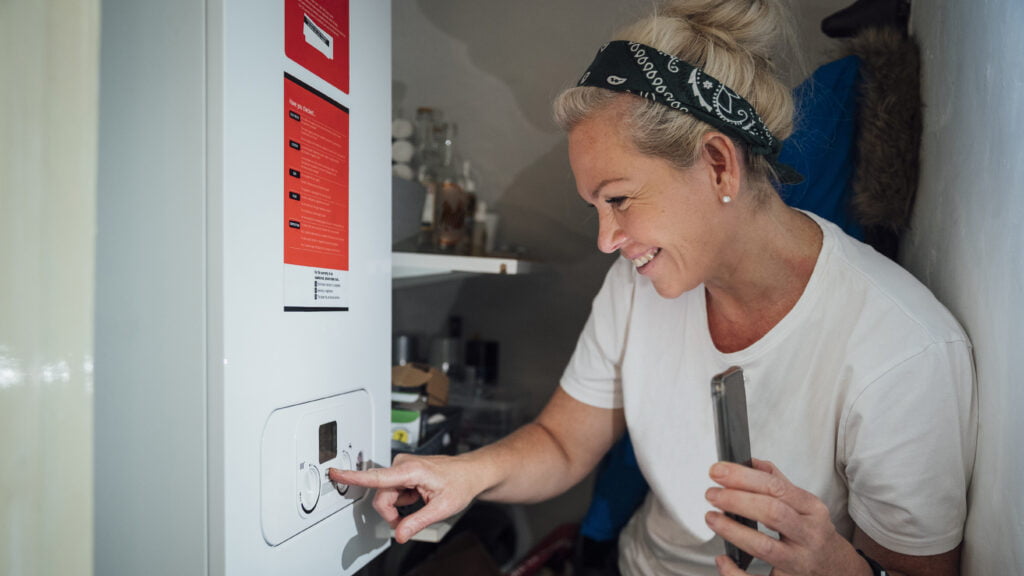
Regular Home-efficiency Maintenance
- Clean or replace all filters in your home regularly. Dirty filters make your system work harder and run longer than necessary.
- Clean and service furnaces regularly. Oil-fired furnaces need annual maintenance, and other fossil fuel furnaces (ex. natural gas and propane) should be serviced at least every two years.
- Change furnace filters at least every 90 days (or cleaned, if you use a permanent filter).
- Empty or bleed the air from hot water radiators once or twice a year so they can fill fully with water and work more efficiently.
- Keep air flowing by not obstructing vents or return air grilles with furniture.
Preventing Drafts and Heating/Cooling Loss
- Apply weather stripping around older exterior doors
- Seal cracks and penetrations on the walls, ceilings, or floors to prevent air from escaping into the walls and roof
- Seal areas of air leakage around all window and door casings, mouldings, and baseboards
- Install foam insulation gaskets behind the electrical outlet and light switch. faceplates
- Seal all supply ductwork with aluminum foil duct tape, approved flexible plastic tape or water-based mastic to improve comfort
- Make sure heating, cooling, and ventilation ducts running through basements, crawl spaces, or unheated attics are sealed and insulated
- Insulate hot and cold-water pipes by covering the first two metres with foam sleeves. Leave a 15 cm (6-inch) clearance between insulation and vent pipes on fuel-fired water heaters
Kitchen
- Use the microwave to reheat food
- Don’t pre-rinse dishes; scrape dishes instead, and let the washing do the rest
- Use the air-dry feature on a dishwasher
- Use the energy-saving dishwasher setting for the best cleaning in the least amount of time, with the least amount of energy
- Allow room for airflow in your fridge (don’t overfill)
- Keep the fridge away from heat sources such as heat vents, stoves, and the sun
Bathroom
- Install a water-saving shower head to use less hot water (look for one that has a flow rate of less than 7.6 litres per minute)
- Take a shower instead of a bath to save on hot water costs
- Use a low-flow toilet that uses 4.8 litres per flush to save water
- Buy a faucet aerator to use less hot water (choose aerators that deliver 3.0 to 5.7 litres per minute of water)
- Install a timer switch for your fan (do not leave manual fans running unattended)
Laundry
- Pre-soak stained clothes (avoid re-washing)
- Choose high-speed or extended spin to remove the maximum amount of water before drying clothes
- Wash in warm or preferably cold water.
- Clean the lint trap in the dryer after every load to maximize airflow and efficiency
- Avoid over-drying; use the sensor setting or time it just right
- Don’t overfill the dryer to ensure maximum airflow and reduce strain on the motor
- Sort by thickness, light items in one load, thick items in another
- Avoid the dryer and air-dry clothes
Appliances
Upgrade to ENERGY STAR® certified appliances and fixtures
- Fridge (use 10% less energy*)
- Range hood fan (use 50% less energy*)
- Dishwasher (use 12% less energy*)
- Washing machine: (save 25% more energy, use 33% less water*)
- Clothes Dryer (save 20% more energy*)
- Water heaters
- Bathroom ventilation fan (use 50% less energy*)
- TV (use 25% less energy*)
- Audio/video products (use up to 70% less energy*)
- Computer monitors (use 25% less energy*)
- Cordless phone (use 40% less energy*)
- Lighting fixtures (use up to 90% less energy**)
- Ceiling fans (use 60% less energy*)
*Compared to standard models/ **Compared to incandescent bulbs
Electrical
- Replace light bulbs with LED bulbs
- Use dimmable LED bulbs and compatible dimmer switches
- Use a smart power strip to cut power to devices not in use
- Enable low power settings on devices to save energy and help your batteries last longer
- Use natural light from windows instead of turning on the lights
- Turn off lights when not in use
- Install motion sensors to reduce your light use
- Create some summer shade
- Use awnings, blinds, or drapes to keep direct rays of sunshine from overheating the room in the summer
- Plant strategically positioned trees to help keep direct sunlight from overheating your home in the summer